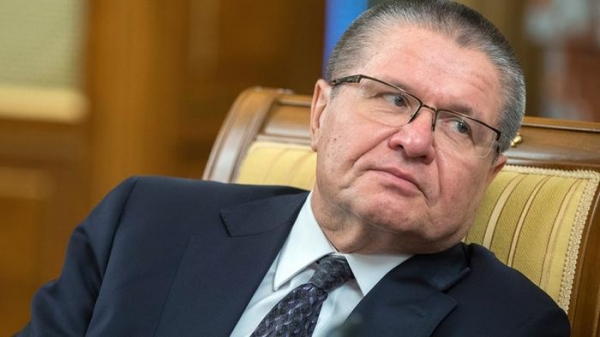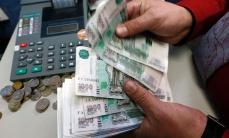In four years, Russia will be a plus
The Ministry of economic development revised the forecast for 2016-2018, and amounted to 2019 “Vedomosti” managed to find its parameters: price of oil will remain in the range of $40-50/bbl., economy out of recession in 2017 at $45/bbl., at the same time stop the decline of the main economic indicators — wages, income, investment, industry. Inflation by the beginning of 2020 will slow to 5%, capital outflow would fall to $20 billion, the ruble will be strengthened to 56.7 rubles/$.

The updated forecast will be submitted to the government in April, recalled the words of the Minister Alexei speaker, the representative of the Ministry of economic development. The Finance Ministry has serious objections against this forecast, knows Federal official. The Finance Ministry does not comment.
The forecast becomes the basis for the budget, but last year a three-year plan was priostanovleno instability of the oil market. Return whether the government is planning for three years, is yet to be determined.
Incorrect inflation
The Ministry expects a gradual growth of oil prices — from us $40/bbl. this year up to $50 in 2018 and 2019 shall not exceed the level that the Finance Ministry was considered as the basis for a new fiscal rule — the cut-off price of $50/bbl., above which oil revenues are accumulated in the reserve Fund. Still previous for the price collapse was cancelled: in 2016, the Finance Ministry used the target for the budget deficit to 3% of GDP. It was assumed that the deficit will be reduced annually by 1 p. p. in 2019, the budget will be deficit-free if $50/bbl.
The price of oil is crucial to determine the pace of reduction of budget expenditures, explains a Federal official, but is too quick cost-cutting is hurting the economy.
See also

Vnesheconombank will save the money of pensioners, the Central Bank and state-owned companies
In addition, the election period is usually accompanied by the growth of social spending, much truncated in 2016: income for 2015-2016 will be reduced by more than 8%, expects the Ministry of economic development. According to the forecast from 2017 the growth of real incomes and real wages will resume, although by the beginning of 2020, they will remain below the 2014 level by 5 and 7%. Earlier, the Ministry proceeded from the assumption that all the coming years, pensions will be indexed according to the inflation target of the Central Bank — at 4%, i.e. below actual inflation, as in 2016, But very likely from 2017, the government will return to the same obligations — indexed on the inflation rate of the previous year, explained the speaker.
The Outlook for inflation is one of the points that was not approved by the Ministry of Finance, says a Federal official. “The Finance Ministry believes that insurmountable obstacles to achieve the inflation target to 4% in 2017 the Bank of Russia not present” — confirms the Deputy Minister Maxim Oreshkin. According to the forecast of the Central Bank, inflation by the end of 2016 will amount to 6-7%, in 2017 — 4%. According to the forecast of Ministry of economic development, 4% in the foreseeable future will not be achieved.
Every “extra” rate of inflation require additional social spending, especially on pensions. Last summer, during the dispute about indexing-2016 the Ministry of Finance estimated the difference between the indexation of pensions by 12 and by 5.5% to 450 billion rubles ; thus, each additional 1% could cost the budget about 70 billion rubles.
Growth despite
In the baseline forecast of the economy for the 2015-2018 decrease of 0.5%. But in 2019, despite the stagnation of oil prices, will accelerate the growth rate to 2.5% and compensates for the loss. The scale of the downturn of the economy in 2016 is reduced to a symbolic 0.3 percent, while in January, the Ministry expected a decline of 0.8% at the same level of oil prices and a smaller decline in industrial production and private consumption. Only improved the forecast on capital investments and on real wages. The prospects for improve consumer demand will encourage companies to increase reserves, explained officials of the Ministry of economic development sources of economic growth expected from the second half of 2016.
See also

The most acute problems the Russians have called the poverty and unemployment
To overcome the effects of the four-year decline in investment by 2020 will fail, but the rate of recovery in 2018-2019. the Ministry of economic development has increased almost 1.5 times: for example, in 2019 — almost 5%. Companies have resources, but no certainty, a signal that she has arrived, should give the state, said the speaker: “Business waits for the signal that it is already possible to invest”. One of these signals is an increase in the refinancing under the program of project financing, which is pressing for the speaker.
The reduction of the budget deficit to 1% in 2019-2020 at the current level of taxes would mean a reduction in costs of 9% in real terms per year, calculated Natalia Akindinova from the development Center of the HSE. Fiscal consolidation can be a major factor in the contraction of the economy: oil at $50/bbl. the decline will resume in 2018 and continue through 2019, predicts the Centre of development.
Reduce costs could be offset by better conditions for investment, but Akindinova sees no reason to expect changes in the repressive bias against the business. The increase in the price of oil to $50 will reduce the decline of investments, but the sources of growth in sight, she said: business is more likely to fight for survival. In accelerating the economy and stagnant oil prices, it also doubts: “Even at a stable $110/bbl. the economy would go down”.








